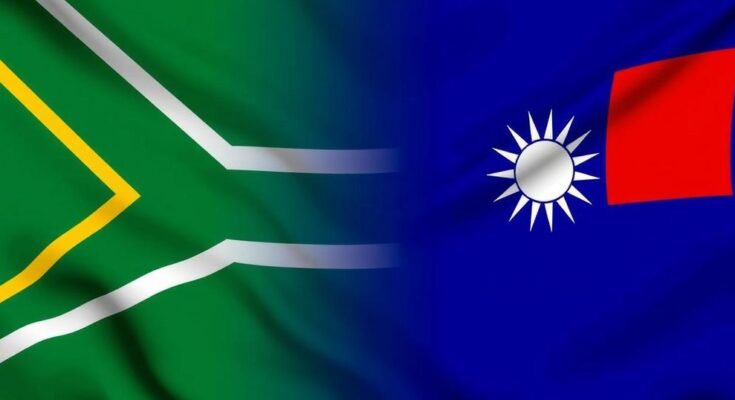South Africa has requested Taiwan to relocate its Taipei Liaison Office from Pretoria to Johannesburg, underscoring its efforts to appease China following a political shift in government. This move, perceived as influenced by Chinese pressure, prompts Taiwan to consider reciprocal measures. Analysts cite the ANC’s necessity to maintain a favorable relationship with China amid changing political landscapes and point to a broader pattern of Chinese influence over African nations regarding the One-China policy.
In a significant diplomatic move, South Africa has requested Taiwan to relocate its unofficial embassy, the Taipei Liaison Office, from the capital of Pretoria to Johannesburg. This action reflects the African National Congress’s (ANC) efforts to solidify its alignment with China amid a shifting political landscape following recent elections that diminished its absolute majority. The restructuring of Taiwan’s representation in South Africa is viewed by analysts as a response to pressures from Beijing, particularly given Taiwan’s longstanding presence in Pretoria since the late 1990s. The South African Department of International Relations and Cooperation announced that the liaison office would undergo a rebranding as a trade office and its move represents a redefinition of the relationship between South Africa and Taiwan, emphasizing its non-political nature. “This also aligns with standard diplomatic practice that capital cities are the seats of Foreign Embassies and High Commissions,” they stated, granting Taiwan six months to comply with this directive. While Taiwan remains unrecognized officially by South Africa and most nations worldwide due to China’s staunch One-China policy, the Taiwanese officials perceive this decision as yielding to Chinese influence, expressing hope for the South African government to reconsider the relocation. The Taiwanese Ministry of Foreign Affairs indicated potential reciprocal actions, including visa restrictions for South Africans and other diplomatic measures, should South Africa proceed with the order. China has welcomed this decision, commending it as a rightful action in support of its One-China stance, with spokesperson Mao Ning stating, “We commend South Africa’s right decision to move the Taipei Liaison Office in South Africa outside the administrative capital Pretoria; ‘Taiwan independence’ finds no support from the people and will only fail.” The backdrop of this decision includes a transformative political context in South Africa, wherein the ANC must reassure China of continued friendly relations post-election. Analysts suggest that the coalition government, which includes elements critical of South Africa’s previous robust relations with China, may have influenced the ANC’s decision-making. Furthermore, the leading opposition party, the Democratic Alliance (DA), has expressed concern regarding the unilateral adjustment to the bilateral framework with Taiwan, alleging that external pressures may have led to this decision. The historical context reveals a pattern of Chinese influence across Africa, where nations have been compelled to recognize the One-China policy. Notably, Nigeria mirrored this action in 2017 under similar pressures. As China fortifies its position as a premier trade partner in Africa, backed by substantial investments and infrastructure initiatives like the Belt and Road Initiative, its impact on African diplomatic relations continues to grow.
The article explores South Africa’s recent decision to downgrade its diplomatic relations with Taiwan by requesting the movement of the Taipei Liaison Office out of Pretoria. This decision is situated within a broader geopolitical framework where China’s influence in Africa is palpable, particularly regarding the One-China policy and Taiwan’s status. The backdrop includes a reformation of South African politics after the ANC lost its absolute majority, prompting a coalition government that necessitates appeasing various stakeholders, including Chinese interests. As noted, the dynamic of Taiwan’s international recognition and interactions has been deeply intertwined with China’s assertiveness in the region, making this development significant in the study of international relations in Africa.
In summary, South Africa’s directive for Taiwan to relocate its liaison office stems from a mixture of internal political shifts and external pressures from China, reaffirming the complexities of diplomatic relations in a post-apartheid context. As geopolitical dynamics continue to evolve, this incident underscores the precarious position Taiwan occupies on the global stage and the extent of China’s influence in African nations. The potential consequences of South Africa’s actions may reverberate across the continent as other nations navigate their relationships with both China and Taiwan.
Original Source: www.voanews.com




